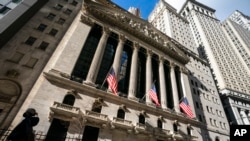Hopes for an economic soft landing are once again powering U.S. stocks higher, as encouraging data relieve recession worries following a brutal sell-off earlier this month.
The S&P 500 .SPX has rebounded more than 6% since Aug. 5, when a steep drop pushed the benchmark U.S. index to its biggest three-day slide in over two years. A rapid return to calm was also evident in the Cboe Volatility Index .VIX, or Wall Street's "fear gauge," which has retreated from last week’s four-year highs at a record pace.
Driving the turnaround are last week's reports on retail sales, inflation and producer prices, which helped allay worries over an economic slowdown sparked by weaker-than-expected employment data at the start of the month. The favorable data has bolstered the case for investors looking to hop back aboard many of the trades that have worked this year, from buying Big Tech stocks to a more recent bet on small and mid-cap names that accelerated in July.
"There was a real growth scare that had emerged," said Mona Mahajan, senior investment strategist at Edward Jones. "Since then, what we've seen is the economic data has actually come out in a much more positive light."
Some of 2024's biggest winners have staged strong rebounds since Aug. 5. Chipmaker Nvidia NVDA.O has bounced more than 20%, while the Philadelphia SE Semiconductor index .SOX has gained more than 14%. Small-cap shares, which had been strong performers in July, have also recovered from recent lows, with the Russell 2000 .RUT up nearly 5%.
Meanwhile, traders are unwinding bets that the Federal Reserve will need to deliver jumbo-sized rate cuts in September to stave off a recession.
As of late Thursday, futures tied to the Fed funds rate showed traders pricing a 25% chance that the central bank will lower rates by 50 basis points in September, down from around 85% on Aug. 5, CME FedWatch data showed. The probability of a 25 basis point cut stood at 75%, in line with expectations that the Fed will kick off an easing cycle in September.
"You can't necessarily rule out the hard landing scenario outright, but there's a lot of reason to believe that at this point that economic momentum is being sufficiently sustained," said Jim Baird, chief investment officer with Plante Moran Financial Advisors.
The Fed's plans could become clearer when Chair Jerome Powell speaks at the central bank's annual economic policy symposium in Jackson Hole, Wyoming.
"We think a key highlight of Powell's speech will be the acknowledgement that progress on inflation has been sufficient to allow the start of rate cuts," economists at BNP Paribas said in a note on Thursday.
For the year, the S&P 500 is up more than 16% and is within about 2% from its July all-time closing high.
Mahajan, of Edward Jones, expects the soft-landing scenario, combined with lower interest rates, to help pave the way for more stocks to participate in the market's rally, instead of the small number of megacaps that have led indexes higher for much of this year.
Analysts at Capital Economics believe that a U.S. economic soft landing will support the artificial intelligence fervor that helped drive markets higher.
"Our end-2024 forecast for the S&P 500 remains at 6,000, driven by a view that the AI narrative which dominated in the first half of the year will reassert itself," they wrote. That target would be some 8% from the S&P 500's closing level on Thursday.
The recent economic data, while reassuring, is far from an all-clear for markets heading into September, which has historically been one of the year's more volatile periods. Investors will be closely watching Nvidia's earnings at the end of the month, and another employment report on Sept. 6.
"There's been a sigh of relief in the market, clearly," said Quincy Krosby, chief global strategist at LPL Financial. "The question now is, will the next payroll report underpin what the market expects at this point in terms of the soft landing."






